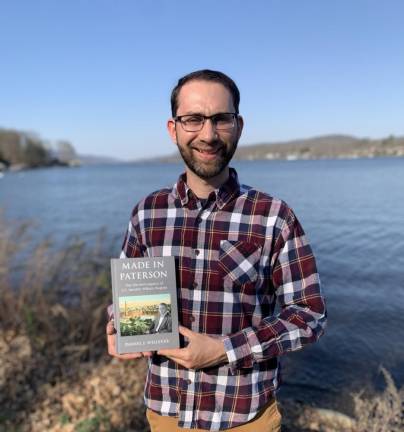Local author will speak today at museum
WEST MILFORD. Daniel Willever will discuss U.S. Sen. William Hughes’ connections to Greenwood Lake on Saturday at the West Milford Museum.

West Milford resident Daniel Willever, author of “Made in Paterson - The Life and Legacy of U.S. Senator William Hughes,” will speak at 2 p.m. June 3 at at the West Milford Museum, 1477 Union Valley Road.
His topic will be “Sterling Forest Senator Bill Hughes at Greenwood Lake 1893-1917.”
The presentation free and open to the public. Light refreshments will be served.
Willever, a social studies teacher at Ramsey High School, was the only New Jersey teacher to win a $25,000 Milken Foundation award in 2019. The award recognizes outstanding teachers from across the nation for their classroom innovations.
His new book about Hughes tells the story of a poor Irish immigrant, bobbin boy and silk weaver who became a local labor leader, jurist and politician of national renown.
Willever traces Hughes’ short life from the silk mills of Paterson to the U.S. Senate and explores his connections to Greenwood Lake.
Willever has a bachelor’s degree from Gettysburg College and master’s degrees from Drew University and the University of Illinois.
A lifelong learner, he studied the pedagogy of play, project-based learning and design thinking as a Woodrow Wilson Institute Fellow in Princeton.
He was one of 15 U.S. social studies teachers to travel to Japan for cultural and professional experiences as a Keizal Koho Fellow.
At Ramsey High School, he has created units for his classes exploring modern American history through a presidential election role play and studying public policy on population decline in Japan.
He wrote the curriculum for World and National Affairs, a Ramsey High School elective, to challenge students to confront narratives in local, global and social media using project-based learning.
“High school students, especially juniors and seniors I have the privilege to teach, are generally more aware of the world around them,” he said. “They are finding jobs, hunting for colleges, figuring out what life will be for them beyond high school.
“They are getting to an age where so much is expected of them as citizens and young adults, and I want to equip them with the skills to handle those expectations responsibly. As such, I have to engage them in a way that is more complex.
“I can expose them to complicated issues - at local, national and global scales - and help them realize that not only do these problems affect their lives, but they must play an active role in solving them.”